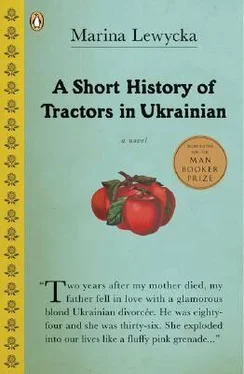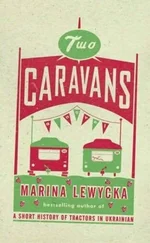A month later there is another crisis. Valentina’s sister is arriving from Ukraine. She is coming to see for herself the good life in the West that Valentina has described in her letters-the elegant modern house, the fabulous car, the wealthy widower husband. She must be met at Heathrow by car. My father says the Rover will not make it to London and back. Oil is leaking from the engine and fluid from the brakes. The engine smokes. One of the seats has collapsed. Rust has bubbled up through the dealer’s patch and polish. Stanislav sums up the problem.
“Auto ne prestijeskiy.” He says it with that little sweet smile that is half-way to a sneer.
Valentina turns on my father.
“You no good man. You plenty-money meanie. Promise money. Money sit in bank Promise car. Crap car.”
“You demand prestigious car. Prestijeskiy auto. Looks prestigious; doesn’t go. Ha ha.”
“Crap car. Crap husband. Thphoo!” she spits.
“Where you learning this new ‘crap’ word?” demands my father. He isn’t used to being bossed about. He’s used to getting his own way, to being wheedled and coaxed.
“You engineer. Why you no mending car? Crap engineer.”
My father has dismantled and reassembled engines in the garage for as long as I can remember. But he can’t get down under the car any more: his arthritis won’t let him.
“Tell your sister she is coming by train,” my father answers back. “Train. Plane. All modern transport is better. Crap car. Of course is crap car. You wanted. Now you have.”
And there is another problem. Crap cooker. The cooker in the kitchen, which has been there since my mother’s time, is getting old. Only two of the three rings will work, and the oven timer is gone, though the oven itself still works. On this cooker, heavenly delights of culinary art have been prepared for more than thirty years, but this will not impress Valentina’s sister. The cooker is electric, and everyone but a fool knows that electricity is not as prestigious as gas. Did not Lenin himself admit that communism was socialism plus electricity?
My father agrees to buy a new cooker. He likes spending money, but he has no money left. The cooker will have to be bought on hire purchase. He has seen a special offer at the Co-op. Valentina puts Nikolai into crap car and drives him into town to buy prestigious cooker. Must be gas. Must be brown. Alas, the brown cooker is not included in the special offer. It costs twice as much.
“Look, Valenka, is exactly same cooker. Same knobs. Same gas. Same everything.”
“In former Soviet Union all cookers are white. Crap cookers.”
“But everything in kitchen is white-washing machine white, fridge white, freezer white, cupboards white-tell me what point is to having a brown cooker?”
“You plenty-money meanie. You want give me crap cooker.”
“My wife is cooking on her thirty years. Better than you cooking.”
“You wife peasant Baba. Peasant Baba, peasant cooking. For civilised person, cooker must be gas, must be brown.” She says this slowly and with emphasis, as if repeating a basic lesson to a nincompoop.
My father signs the hire purchase agreement for a civilised person’s cooker. He has never borrowed money before in his life, and the illicit thrill makes him giddy with excitement. When Mother was alive, money was saved in a toffee tin hidden under a loose floorboard beneath the lino, and only when enough money was saved was anything purchased. Always in cash. Always at the Co-op. The Co-op stamps were stuck in a book, and this was kept under the floorboard too. In later years, when Mother discovered you could get interest if you put money in the building society, the building society deposits still started off as cash under the floorboard.
Another problem: the house is dirty. Crap Hoover. The vintage Hoover Junior is not picking up properly. Valentina has seen an advertisement for a civilised person’s Hoover. Blue. Cylinder. See, no pushing about. Just suck, suck, suck. My father signs another hire purchase agreement.
My father told me this, so naturally he told me his side of the story. Maybe there is another version of events that is more favourable to Valentina. If so, I don’t want to hear it. I imagine my father, bent and frail, shaking with impotent rage, and my heart fills up with righteous anger.
“Look, Pappa, you must stand up to her. Just tell her she can’t have everything she wants.”
“Hmm,” he says. “ Tak .” He says yes, but his voice lacks conviction. He likes to grumble to a sympathetic audience, but he won’t do anything about it.
“She has unrealistic expectations, Pappa.”
“But for this she cannot be blamed. She believes all Western propaganda.”
“Well she’ll just have to learn, won’t she?” Acid in my voice.
“But still, better you not talk to Vera about this.”
“Of course not.” (I can’t wait!)
“You see, Nadezhda, she is not a bad person. She has some incorrect ideas. Not her fault.”
“We’ll see.”
“Nadezhda…”
“What?”
“You are not talking about this with Vera.”
“Why not?”
“She will laugh. She will say I have told you so.”
“I’m sure she won’t.” (I know she will.)
“You know this Vera, what a type she is.”
Despite myself, I feel myself getting sucked into the drama, and back into my childhood. It has a hold of me. Just like civilised person’s Hoover. Suck, suck, suck. And I am dragged up into the dustbag of the past, full of clotted greying memories, where everything is formless, indistinct, lumpy with obscure gobs of matter shrouded in ancient dust-dust everywhere, drowning me, burying me alive, filling my lungs and my eyes until I cannot see, cannot breathe, can barely cry out, “Pappa! Why are you always so angry with Vera? What did she do?”
“Ah, that Vera. She was always autocrat, even when baby. Clinging to Ludmilla with fists of steel. Grip tight. Suck, suck, suck. Such a temper. Crying. Screaming.”
“Pappa, she was only a baby. She couldn’t help it.”
“Hmm.”
My heart cries out, “You should love us. You’re supposed to love us, no matter how bad we are! That’s what normal parents do!” But I can’t say it aloud. And anyway, he can’t help it, can he? Growing up with Baba Nadia with her thin soups and strict punishments.
“None of us can help how we are,” I say.
“Hmm. Of course this question of psychological” (he pronounces both consonants: p, s) “determinism is very interesting to discuss. Leibniz, for example, who by the way was a founder of the modern mathematics, believed that all was determined in the moment of creation.”
“Pappa…”
“ Tak tak . And smoking all the time. Smoking even by Milla’s death-bed. What a powerful tyrant is a cigarette.” He realises my patience is running thin. “Did I ever tell you, Nadia, that I almost died from cigarettes?”
Is this a crude changing-the-subject ploy? Or has he become completely unhinged?
“I didn’t know you smoked.”
Neither of my parents smoked. Not only that, but they had kicked up such a dreadful fuss when I started smoking at the age of fifteen that I never got completely hooked, and gave up a few years later, having made my point.
“Ha! It was because I did not smoke that cigarettes saved my life, and for the same reason, they almost cost me my life.” He shifts his voice into an easy narrative gear. He is in control now, driving his tractor across the crumbling furrows of the past. “You see, in that German labour camp where we found ourselves at ending of war, cigarettes were a currency followed by everybody. When we worked we got paid: so much bread, so much fat, so many cigarettes. So any person who did not smoke his cigarettes could exchange them for food, clothing, even luxuries such as soap or blankets. Because of cigarettes, we always had enough to eat, were always warm. That was how we survived through war.” He fixes his eyes on a spot behind my head. “Vera, unfortunately, is now of course a smoker. Has she told you about her first encounter with cigarettes?”
Читать дальше












